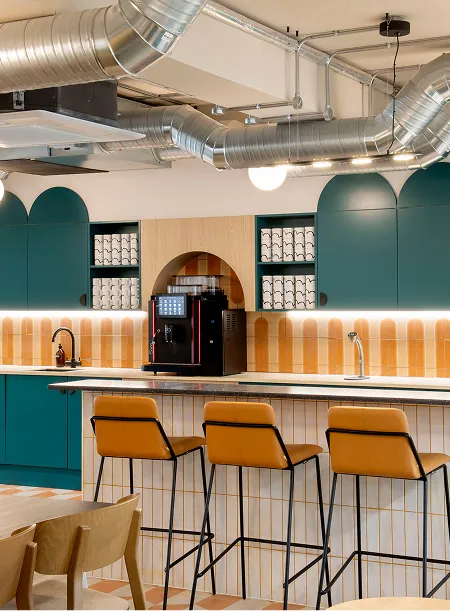What is WeWork? A Complete Guide to Its History, Services & FAQ

Introduction:
WeWork is one of the most recognisable names in flexible office space. Founded in New York in 2010, it grew into a global brand with thousands of sites worldwide before its infamous IPO collapse and bankruptcy. Today, WeWork continues to operate, but on a smaller scale.
But what exactly is WeWork, how does it work, and what is its future in London? Here's the full story, plus how it stacks up against other flexible office providers in the city.
What Is WeWork?
WeWork provides coworking spaces and flexible offices, designed for freelancers, startups, and larger companies that need short-term space without the commitment of a traditional long-term lease. Its London buildings, located in key hubs like Shoreditch, Waterloo, and Canary Wharf, are fitted out with breakout spaces, hot desks, private offices, and meeting rooms.
WeWork’s original selling point was always more than just desks. Its spaces were intended to emphasise design, networking, and a hospitality-style experience, offering amenities like communal kitchens, Wi-Fi, on-site event programmes, and breakout zones.
A Short History: Rise, Fall, and Restructuring
- 2010–2018: Global Expansion: Founded in New York in 2010 by Adam Neumann and Miguel McKelvey, WeWork expanded rapidly, fuelled by billions in venture capital. By 2014, it was the fastest-growing lessee of office space in New York. London quickly became its largest international market, with a significant concentration of sites in the City, West End, and East London. The company's unique "community" approach and massive valuation made it a startup darling, eventually reaching a $47 billion valuation in 2019.
- 2019: IPO Collapse: The company's plan to go public fell apart under intense scrutiny. Public filings revealed massive financial losses and significant corporate governance issues, including co-founder Adam Neumann's self-dealing and unconventional leadership style. Investors and the media baulked at the company's precarious financial position, leading to the failed IPO and Neumann being ousted.
- 2020–2022: Pandemic Pressure and a Documentary: The COVID-19 pandemic dealt a huge blow to WeWork's business model. With a widespread shift to remote work, demand for office space, particularly in dense city centres, fell abruptly. WeWork was forced to close or consolidate numerous locations as it struggled to pay for its expensive, long-term leases.
In 2021, a documentary was released called WeWork: Or The Making and Breaking of a $47 Billion Unicorn. The film won an Emmy in 2022 in the News and Documentary category for Outstanding Business and Economic Documentary. The documentary investigates Adam Neumann's story from WeWork founder to being forced out of the company after an unsuccessful IPO.
- 2023–2024: Bankruptcy and Rebirth: On November 6, 2023, WeWork filed for Chapter 11 bankruptcy in the US. This was a strategic move to restructure its debt and reject hundreds of unprofitable leases, giving it a chance to survive. The company successfully emerged from bankruptcy on June 11, 2024, with Yardi Systems becoming the majority owner with a 60% equity stake. While other lenders, including SoftBank, received smaller equity shares, fresh capital was injected to sustain WeWork through the restructuring period.
WeWork's Business Model and Its Achilles' Heel
WeWork’s growth was built on a model of real estate arbitrage: signing long-term leases on large office buildings (often 10-15 years) and then subletting the space short-term (month-to-month, or even daily) to members. In a growing market, this allowed WeWork to profit from the difference between its long-term rent and the higher, short-term rates it charged members.
The risk? If demand for flexible offices dropped, as it did during the pandemic, they were still tied to expensive, long-term leases, resulting in billions in losses. This fundamental mismatch between long-term liabilities and short-term revenue proved to be the company's Achilles' heel. Since its bankruptcy, WeWork has focused on a more sustainable, asset-light model, where it manages properties for landlords rather than taking on the full risk of the lease.
WeWork: Services & Current Status
Today, WeWork's services in London are consistent with its global offerings:
- Private Offices: Self-contained, furnished, and move-in-ready spaces for teams of all sizes.
- Dedicated Desks: A fixed desk in a shared office for individuals (usually freelancers) who need a consistent workspace.
- Hot Desks: Flexible seating in open-plan communal lounges on a first-come, first-served basis.
- All Access: A monthly pass that grants access to WeWork's network of sites across London.
- On-Demand/Day Passes: A pay-as-you-go service for booking desks by the day or meeting rooms by the hour.
Current London locations are concentrated in financial and creative hubs, including the City, Canary Wharf, Waterloo, and Shoreditch. While the total number of sites is fewer than its pre-2020 peak, WeWork still maintains a significant footprint.
London's Coworking Market: WeWork vs. Competitors
WeWork is not the only player in London's thriving flexible office market. Competitors fall into several key categories:
- Large, Global Rivals: Large, Global Rivals: Fora and IWG (which owns brands like Regus and Spaces) are major competitors. Unlike WeWork's tech-driven model, IWG has a more traditional real estate background and operates a vast, often more utilitarian, network of locations. Fora, by contrast, competes with WeWork at the premium end, prioritising design and hospitality over scale and tech.
- London-Born & Community-Led Providers: Companies like Runway East, Huckletree, and Work.Life have a strong presence in London, often focusing on a specific vibe, niche, or community. They tend to offer more curated events and a bespoke feel.
- Boutique & Design-Led Operators: Providers such as The Fisheries and Second Home focus heavily on high-end design and premium amenities, often catering to corporate clients and a more discerning clientele.
FAQs
- Is WeWork still in business in London? Yes. Following its exit from bankruptcy in June 2024, WeWork continues to operate multiple sites in London, though its footprint is smaller than before.
- Why did WeWork struggle? Its business model, which relied on long-term leases and short-term memberships, left it highly vulnerable to a drop in demand. The failed 2019 IPO and the widespread shift to remote work during the COVID-19 pandemic accelerated its financial collapse.
- What is the difference between All Access and On-Demand? All Access is a monthly subscription for unlimited access to a wide network of WeWork locations. On-Demand is a pay-per-use service for booking desks and rooms on a daily or hourly basis.
- What amenities are included in a WeWork membership? While each location may vary slightly, their standard offering includes Wi-Fi, phone booths, meeting rooms, communal lounges, and stocked kitchens with coffee and beverages. Many locations also offer premium amenities like showers, event spaces, and bike storage.
Bottom Line for Londoners
WeWork changed the office landscape in London, but its story serves as both a testament to its innovation and a cautionary tale of its flaws. While its footprint has shrunk, it remains a significant presence with central locations and a good offering.
If you're looking for a flexible office in London, it's a good idea to explore all your options. Compare providers based on location, community, amenities, and contract terms to find the perfect fit for your business.
We recommend Runway East (obviously), book a tour and see what all the fuss is about today!
Curious to know how much an office at a WeWork costs in London? We've got you covered with this guide: https://runwayea.st/blog/flexible-working
Got Questions? We've Got Answers
We've put together some FAQs to help you settle into life at Runway East.
find your
perfect space
Discover flexible workspace solutions across London, Bristol, Bath, Brighton, and Birmingham. From private offices to enterprise suites, find a space that grows with your team and keeps them happy every day.
.webp)


.avif)
.avif)
.avif)